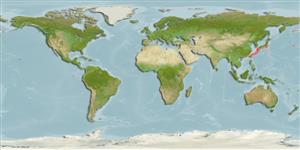Common names from other countries
Environment: milieu / climate zone / depth range / distribution range
पारिस्थितिकी
समुद्री बेनथोपिलाजिक; गहराई सीमा 361 - 544 m (Ref. 58018). Subtropical
Northwest Pacific: southern Japan and northeastern Taiwan.
आकार / वज़न / Age
Maturity: Lm ? range ? - ? cm
Max length : 51.0 cm TL पुल्लिंग / अलिंग; (Ref. 559)
Short description
आकृति विज्ञान | मौरफोमैटरिक्स
Head moderately wide and comparatively firm, slightly longer that 1/2 length to vent. Snout low, not broad, slightly longer than or as long as orbit; width at frontal margin of orbit much narrower than twice preocular length. Orbit large. Mouth terminal and lateral, slightly oblique. Teeth minute, rather conical in shape, set in broad band on premaxillary and in narrow band on dentary. Scales small, cycloid, thin, and deciduous. Mandibular ramus with double scale rows, one of which consisting of large scales and the other smaller ones (Ref. 54421).
Life cycle and mating behavior
परिपक्व अवधि | पुनरुत्पत्ति | मछलीऔ का अंडे देना | अंडे | Fecundity | लार्वा
Cohen, D.M., T. Inada, T. Iwamoto and N. Scialabba, 1990. FAO species catalogue. Vol. 10. Gadiform fishes of the world (Order Gadiformes). An annotated and illustrated catalogue of cods, hakes, grenadiers and other gadiform fishes known to date. FAO Fish. Synop. 125(10). Rome: FAO. 442 p. (Ref. 1371)
IUCN Red List Status (Ref. 130435)
CITES (Ref. 128078)
Not Evaluated
Threat to humans
Harmless
Human uses
अधिक जानकारी
आम नामउपशब्दचपायचयपरभक्षीईकोटोकसीकोलौजीपुनरुत्पत्तिपरिपक्व अवधिमछलीऔ का अंडे देनाFecundityअंडेEgg development
Age/Sizeबाढ़Length-weightLength-lengthLength-frequenciesमौरफोमैटरिक्सआकृति विज्ञानलार्वालारवल गतिकीभर्तीबहुतायत
संदर्भजलीयकृषिजलीयकृषि रूपरेखाखींचआनुवंशिकीElectrophoresesहैरेटिबिलटीबीमारीप्रक्रमणMass conversion
सहयोगीयोतस्वीरेStamps, Coins Misc.ध्वनिसिगुयटिरारफ्तारतैरने के प्रकारगिल क्षेत्रOtolithsदिमागदृष्टि
साधन
Special reports
Download XML
इंटरनेट स्रोत
Estimates based on models
Preferred temperature (Ref.
115969): 8.7 - 13.8, mean 10.3 (based on 17 cells).
Phylogenetic diversity index (Ref.
82804): PD
50 = 0.5001 [Uniqueness, from 0.5 = low to 2.0 = high].
Bayesian length-weight: a=0.00372 (0.00141 - 0.00980), b=3.11 (2.88 - 3.34), in cm Total Length, based on LWR estimates for this (Sub)family-body shape (Ref.
93245).
Trophic level (Ref.
69278): 3.2 ±0.3 se; based on size and trophs of closest relatives
Fishing Vulnerability (Ref.
59153): Moderate vulnerability (40 of 100).
